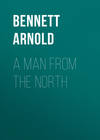Kitabı oku: «Denry the Audacious», sayfa 10
CHAPTER VII. THE RESCUER OF DAMES
I
It next happened that Denry began to suffer from the ravages of a malady which is almost worse than failure – namely, a surfeit of success. The success was that of his Universal Thrift Club. This device, by which members after subscribing one pound in weekly instalments could at once get two pounds' worth of goods at nearly any large shop in the district, appealed with enormous force to the democracy of the Five Towns. There was no need whatever for Denry to spend money on advertising. The first members of the Club did all the advertising and made no charge for doing it. A stream of people anxious to deposit money with Denry in exchange for a card never ceased to flow into his little office in St. Luke's Square. The stream, indeed, constantly thickened. It was a wonderful invention, the Universal Thrift Club. And Denry ought to have been happy, especially as his beard was growing strongly and evenly, and giving him the desired air of a man of wisdom and stability. But he was not happy. And the reason was that the popularity of the Thrift Club necessitated much book-keeping, and he hated book-keeping.
He was an adventurer, in the old honest sense, and no clerk. And he found himself obliged not merely to buy large books of account, but to fill them with figures; and to do addition sums from page to page; and to fill up hundreds of cards; and to write out lists of shops, and to have long interviews with printers whose proofs made him dream of lunatic asylums; and to reckon innumerable piles of small coins; and to assist his small office-boy in the great task of licking envelopes and stamps. Moreover, he was worried by shopkeepers; every shopkeeper in the district now wanted to allow him twopence in the shilling on the purchases of Club members. And he had to collect all the subscriptions, in addition to his rents; and also to make personal preliminary inquiries as to the reputation of intending members. If he could have risen every day at 4 A.M. and stayed up working every night till 4 A.M. he might have got through most of the labour. He did as a fact come very near to this ideal. So near that one morning his mother said to him, at her driest:
"I suppose I may as well sell your bedstead, Denry?"
And there was no hope of improvement; instead of decreasing the work multiplied.
What saved him was the fortunate death of Lawyer Lawton. The aged solicitor's death put the town into mourning and hung the church with black. But Denry as a citizen bravely bore the blow because he was able to secure the services of Penkethman, Lawyer Lawton's eldest clerk, who, after keeping the Lawton books and writing the Lawton letters for thirty-five years, was dismissed by young Lawton for being over fifty and behind the times. The desiccated bachelor was grateful to Denry. He called Denry "sir." Or rather he called Denry's suit of clothes "sir," for he had a vast respect for a well-cut suit. On the other hand, he maltreated the little office-boy, for he had always been accustomed to maltreating little office-boys, not seriously, but just enough to give them an interest in life. Penkethman enjoyed desks, ledgers, pens, ink, rulers, and blotting-paper. He could run from bottom to top of a column of figures more quickly than the fire-engine could run up Oldcastle Street; and his totals were never wrong. His gesture with a piece of blotting-paper as he blotted off a total was magnificent. He liked long hours; he was thoroughly used to overtime, and his boredom in his lodgings was such that he would often arrive at the office before the appointed hour. He asked thirty shillings a week, and Denry in a mood of generosity gave him thirty-one. He gave Denry his whole life, and put a meticulous order into the establishment. Denry secretly thought him a miracle, but up at the Club at Porthill he was content to call him "the human machine." "I wind him up every Saturday night with a sovereign, half a sovereign, and a shilling," said Denry, "and he goes for a week. Compensated balance adjusted for all temperatures. No escapement. Jewelled in every hole. Ticks in any position. Made in England."
This jocularity of Denry's was a symptom that Denry's spirits were rising. The bearded youth was seen oftener in the streets behind his mule and his dog. The adventurer had, indeed, taken to the road again. After an emaciating period he began once more to stouten. He was the image of success. He was the picturesque card, whom everybody knew and everybody had pleasure in greeting. In some sort he was rather like the flag on the Town Hall.
And then a graver misfortune threatened.
It arose out of the fact that, though Denry was a financial genius, he was in no sense qualified to be a Fellow of the Institute of Chartered Accountants. The notion that an excess of prosperity may bring ruin had never presented itself to him, until one day he discovered that out of over two thousand pounds there remained less than six hundred to his credit at the bank. This was at the stage of the Thrift Club when the founder of the Thrift Club was bound under the rules to give credit. When the original lady member had paid in her £2 or so, she was entitled to spend £4 or so at shops. She did spend £4 or so at shops. And Denry had to pay the shops. He was thus temporarily nearly £2 out of pocket, and he had to collect that sum by trifling instalments. Multiply this case by five hundred, and you will understand the drain on Denry's capital. Multiply it by a thousand, and you will understand the very serious peril which overhung Denry. Multiply it by fifteen hundred and you will understand that Denry had been culpably silly to inaugurate a mighty scheme like the Universal Thrift Club on a paltry capital of two thousand pounds. He had. In his simplicity he had regarded two thousand pounds as boundless wealth.
Although new subscriptions poured in, the drain grew more distressing. Yet he could not persuade himself to refuse new members. He stiffened his rules, and compelled members to pay at his office instead of on their own doorsteps; he instituted fines for irregularity. But nothing could stop the progress of the Universal Thrift Club. And disaster approached. Denry felt as though he were being pushed nearer and nearer to the edge of a precipice by a tremendous multitude of people. At length, very much against his inclination, he put up a card in his window that no new members could be accepted until further notice, pending the acquisition of larger offices and other rearrangements.
For the shrewd, it was a confession of failure, and he knew it.
Then the rumour began to form, and to thicken, and to spread, that Denry's famous Universal Thrift Club was unsound at the core, and that the teeth of those who had bitten the apple would be set on edge.
And Denry saw that something great, something decisive, must be done and done with rapidity.
II
His thoughts turned to the Countess of Chell. The original attempt to engage her moral support in aid of the Thrift Club had ended in a dangerous fiasco. Denry had been beaten by circumstances. And though he had emerged from the defeat with credit, he had no taste for defeat. He disliked defeat even when it was served with jam. And his indomitable thoughts turned to the Countess again. He put it to himself in this way, scratching his head:
"I 've got to get hold of that woman, and that's all about it!"
The Countess at this period was busying herself with the policemen of the Five Towns. In her exhaustless passion for philanthropy, bazaars, and platforms, she had already dealt with orphans, the aged, the blind, potter's asthma, crèches, churches, chapels, schools, economic cookery, the smoke-nuisance, country holidays, Christmas puddings and blankets, healthy musical entertainments, and barmaids. The excellent and beautiful creature was suffering from a dearth of subjects when the policemen occurred to her. She made the benevolent discovery that policemen were overworked, underpaid, courteous and trustworthy public servants, and that our lives depended on them. And from this discovery it naturally followed that policemen deserved her energetic assistance. Which assistance resulted in the erection of a Policemen's Institute at Hanbridge, the chief of the Five Towns. At the Institute policemen would be able to play at draughts, read the papers, and drink everything non-alcoholic at prices that defied competition. And the Institute also conferred other benefits on those whom all the Five Mayors of the Five Towns fell into the way of describing as "the stalwart guardians of the law." The Institute, having been built, had to be opened with due splendour and ceremony. And naturally the Countess of Chell was the person to open it, since without her it would never have existed.
The solemn day was a day in March, and the hour was fixed for three o'clock, and the place was the large hall of the Institute itself, behind Crown Square, which is the Trafalgar Square of Hanbridge. The Countess was to drive over from Sneyd. Had the epoch been ten years later she would have motored over. But probably that would not have made any difference as to what happened.
In relating what did happen I confine myself to facts, eschewing imputations. It is a truism that life is full of coincidences, but whether these events comprised a coincidence, or not, each reader must decide for himself according to his cynicism or his faith in human nature.
The facts are: First, that Denry called one day at the house of Mrs. Kemp a little lower down Brougham Street, Mrs. Kemp being friendly with Mrs. Machin, and the mother of Jock, the Countess's carriage-footman, whom Denry had known from boyhood. Second, that a few days later, when Jock came over to see his mother, Denry was present, and that subsequently Denry and Jock went for a stroll together in the Cemetery, the principal resort of strollers in Bursley. Third, that on the afternoon of the opening ceremony the Countess's carriage broke down in Sneyd Vale, two miles from Sneyd and three miles from Hanbridge. Fourth, that five minutes later Denry, all in his best clothes, drove up behind his mule. Fifth, that Denry drove right past the breakdown, apparently not noticing it. Sixth, that Jock touching his hat to Denry as if to a stranger (for, of course, while on duty a footman must be dead to all human ties) said:
"Excuse me, sir," and so caused Denry to stop.
These are the simple facts.
Denry looked round with that careless half-turn of the upper part of the body which drivers of elegant equipages affect when their attention is called to something trifling behind them. The mule also looked round – it was a habit of the mule's – and if the dog had been there the dog would have shown an even livelier inquisitiveness; but Denry had left the faithful animal at home.
"Good afternoon, Countess," he said, raising his hat, and trying to express surprise, pleasure, and imperturbability all at once.
The Countess of Chell, who was standing in the road, raised her lorgnon, which was attached to the end of a tortoiseshell pole about a foot long, and regarded Denry. This lorgnon was a new device of hers, and it was already having the happy effect of increasing the sale of long-handled lorgnons throughout the Five Towns.
"Oh! It's you, is it?" said the Countess. "I see you 've grown a beard."
It was just this easy familiarity that endeared her to the district. As observant people put it, you never knew what she would say next, and yet she never compromised her dignity.
"Yes," said Denry. "Have you had an accident?"
"No," said the Countess bitterly: "I 'm doing this for idle amusement."
The horses had been taken out, and were grazing by the roadside like common horses. The coachman was dipping his skirts in the mud as he bent down in front of the carriage and twisted the pole to and fro and round about and round about. The footman, Jock, was industriously watching him.
"It's the pole-pin, sir," said Jock.
Denry descended from his own hammer-cloth. The Countess was not smiling. It was the first time that Denry had ever seen her without an efficient smile on her face.
"Have you got to be anywhere particular?" he asked. Many ladies would not have understood what he meant. But the Countess was used to the Five Towns.
"Yes," said she. "I have got to be somewhere particular. I 've got to be at the Police Institute at three o'clock particular, Mr. Machin. And I shan't be. I 'in late now. We 've been here ten minutes."
The Countess was rather too often late for public ceremonies. Nobody informed her of the fact. Everybody, on the contrary, assiduously pretended that she had arrived to the very second. But she was well aware that she had a reputation for unpunctuality. Ordinarily, being too hurried to invent a really clever excuse, she would assert lightly that something had happened to her carriage. And now something in truth had happened to her carriage – but who would believe it at the Police Institute?
"If you 'll come with me I 'll guarantee to get you there by three o'clock," said Denry.
The road thereabouts was lonely. A canal ran parallel with it at a distance of fifty yards, and on the canal a boat was moving in the direction of Hanbridge at the rate of a mile an hour. Such was the only other vehicle in sight. The outskirts of Knype, the nearest town, did not begin until at least a mile further on; and the Countess, dressed for the undoing of mayors and other unimpressionable functionaries, could not possibly have walked even half a mile in that rich dark mud.
She thanked him, and without a word to her servants took the seat beside him.
III
Immediately the mule began to trot the Countess began to smile again. Relief and content were painted upon her handsome features. Denry soon learnt that she knew all about mules – or almost all. She told him how she had ridden hundreds of miles on mules in the Apennines, where there were no roads, and only mules, goats, and flies could keep their feet on the steep stony paths. She said that a good mule was worth forty pounds in the Appenines, more than a horse of similar quality. In fact, she was very sympathetic about mules. Denry saw that he must drive with as much style as possible, and he tried to remember all that he had picked up from a book concerning the proper manner of holding the reins. For in everything that appertained to riding and driving the Countess was an expert. In the season she hunted once or twice a week with the North Staffordshire Hounds, and the Signal had stated that she was a fearless horsewoman. It made this statement one day when she had been thrown and carried to Sneyd senseless.
The mule, too, seemingly conscious of its responsibilities and its high destiny, put its best foot foremost and behaved in general like a mule that knew the name of its great-grandfather. It went through Knype in admirable style, not swerving at the steam-cars nor exciting itself about the railway bridge. A photographer who stood at his door manoeuvring a large camera startled it momentarily, until it remembered that it had seen a camera before. The Countess, who wondered why on earth a photographer should be capering round a tripod in a doorway, turned to inspect the man with her lorgnon.
They were now coursing up the Cauldon Bank towards Hanbridge. They were already within the boundaries of Hanbridge, and a pedestrian here and there recognised the Countess. You can hide nothing from the quidnunc of Hanbridge. Moreover, when a quidnunc in the streets of Hanbridge sees somebody famous or striking or notorious, he does not pretend that he has seen nobody. He points unmistakably to what he has observed, if he has a companion, and if he has no companion he stands still and stares with such honest intensity that the entire street stands and stares too. Occasionally you may see an entire street standing and staring without any idea of what it is staring at. As the equipage dashingly approached the busy centre of Hanbridge, the region of fine shops, public-houses, hotels, halls, and theatres, more and more of the inhabitants knew that Iris (as they affectionately called her) was driving with a young man in a tumble-down little victoria behind a mule whose ears flapped like an elephant's. Denry being far less renowned in Hanbridge than in his native Bursley, few persons recognised him. After the victoria had gone by people who had heard the news too late rushed from shops and gazed at the Countess's back as at a fading dream until the insistent clanging of a car-bell made them jump again to the footpath.
At length Denry and the Countess could see the clock of the Old Town Hall in Crown Square, and it was a minute to three. They were less than a minute off the Institute.
"There you are!" said Denry proudly. "Three miles if it's a yard, in seventeen minutes. For a mule it's none so dusty."
And such was the Countess's knowledge of the language of the Five Towns that she instantly divined the meaning of even that phrase "none so dusty."
They swept into Crown Square grandly.
And then, with no warning, the mule suddenly applied all the automatic brakes which a mule has, and stopped.
"Oh, Lor!" sighed Denry. He knew the cause of that arresting.
A large squad of policemen, a perfect regiment of policemen, was moving across the north side of the square in the direction of the Institute. Nothing could have seemed more reassuring, less harmful, than that band of policemen, off duty for the afternoon and collected together for the purpose of giving a hearty and policemanly welcome to their benefactress the Countess. But the mule had his own views about policemen. In the early days of Denry's ownership of him, he had nearly always shied at the spectacle of a policeman. He would tolerate steam-rollers, and even falling kites, but a policeman had ever been antipathetic to him. Denry by patience and punishment had gradually brought him round almost to the Countess's view of policemen – namely, that they were a courteous and trustworthy body of public servants, not to be treated as scarecrows or the dregs of society. At any rate, the mule had of late months practically ceased to set his face against the policing of the Five Towns. And when he was on his best behaviour he would ignore a policeman completely.
But there were several hundreds of policemen in that squad, the majority of all the policemen in the Five Towns. And clearly the mule considered that Denry, in confronting him with several hundred policemen simultaneously, had been presuming upon his good nature.
The mule's ears were saying agitatedly:
"A line must be drawn somewhere, and I have drawn it where my forefeet now are."
The mule's ears soon drew together a little crowd.
It occurred to Denry that if mules were so wonderful in the Apennines the reason must be that there are no policemen in the Apennines. It also occurred to him that something must be done to this mule.
"Well?" said the Countess inquiringly.
It was a challenge to him to prove that he and not the mule was in charge of the expedition.
He briefly explained the mule's idiosyncrasy, as it were apologising for its bad taste in objecting to public servants whom the Countess cherished.
"They 'll be out of sight in a moment," said the Countess. And both she and Denry tried to look as if the victoria had stopped in that special spot for a special reason and that the mule was a pattern of obedience. Nevertheless, the little crowd was growing a little larger.
"Now," said the Countess encouragingly. The tail of the regiment of policemen had vanished towards the Institute.
"Tchk! Tchk!" Denry persuaded the mule. No response from those forefeet!
"Perhaps I 'd better get out and walk," the Countess suggested. The crowd was becoming inconvenient and had even begun to offer unsolicited hints as to the proper management of mules. The crowd was also saying to itself, "It's her! It's her! It's her!" Meaning that it was the Countess.
"Oh, no!" said Denry. "It's all right."
And he caught the mule "one" over the head with his whip.
The mule, stung into action, dashed away, and the crowd scattered as if blown to pieces by the explosion of a bomb. Instead of pursuing a right line the mule turned within a radius of its own length, swinging the victoria round after it as though the victoria had been a kettle attached to it with string. And Countess, Denry, and victoria were rapt with miraculous swiftness away – not at all towards the Policemen's Institute, but down Longshaw Road, which is tolerably steep. They were pursued, but ineffectually. For the mule had bolted and was winged. They fortunately came into contact with nothing except a large barrow of carrots, turnips, and cabbages which an old woman was wheeling up Longshaw Road. The concussion upset the barrow, half filled the victoria with vegetables, and for a second stayed the mule; but no real harm seemed to have been done, and the mule proceeded with vigour. Then the Countess noticed that Denry was not using his right arm, which swung about rather uselessly.
"I must have knocked my elbow against the barrow," he muttered. His face was pale.
"Give me the reins," said the Countess.
"I think I can turn the brute up here," he said.
And he did in fact neatly divert the mule up Birches Street, which is steeper even than Longshaw Road. The mule for a few instants pretended that all gradients, up or down, were equal before its angry might. But Birches Street has the slope of a house-roof. Presently the mule walked, and then it stood still. And half Birches Street emerged to gaze. For the Countess's attire was really very splendid.
"I 'll leave this here, and we 'll walk back," said Denry. "You won't be late – that is, nothing to speak of. The Institute is just round the top here."
"You don't mean to say you 're going to let that mule beat you!" exclaimed the Countess.
"I was only thinking of your being late," said he.
"Oh, bother!" said she. "Your mule may be ruined." The horse-trainer in her was aroused.
"And then my arm?" said Denry.
"Shall I drive back?" the Countess suggested.
"Oh, do!" said Denry. "Keep on up the street, and then to the left."
They changed places, and two minutes later she brought the mule to an obedient rest in front of the Police Institute, which was all newly red with terra-cotta. The main body of policemen had passed into the building, but two remained at the door, and the mule haughtily tolerated them. The Countess despatched one to Longshaw Road to settle with the old woman whose vegetables they had brought away with them. The other policeman who, owing to the Countess's philanthropic energy, had received a course of instruction in first aid, arranged a sling for Denry's arm. And then the Countess said that Denry ought certainly to go with her to the inauguration ceremony. The policeman whistled a boy to hold the mule. Denry picked a carrot out of the complex folds of the Countess's rich costume. And the Countess and her saviour entered the portico and were therein met by an imposing group of important male personages, several of whom wore mayoral chains. Strange tales of what had happened to the Countess had already flown up to the Institute, and the chief expression on the faces of the group seemed to be one of astonishment that she still lived.







